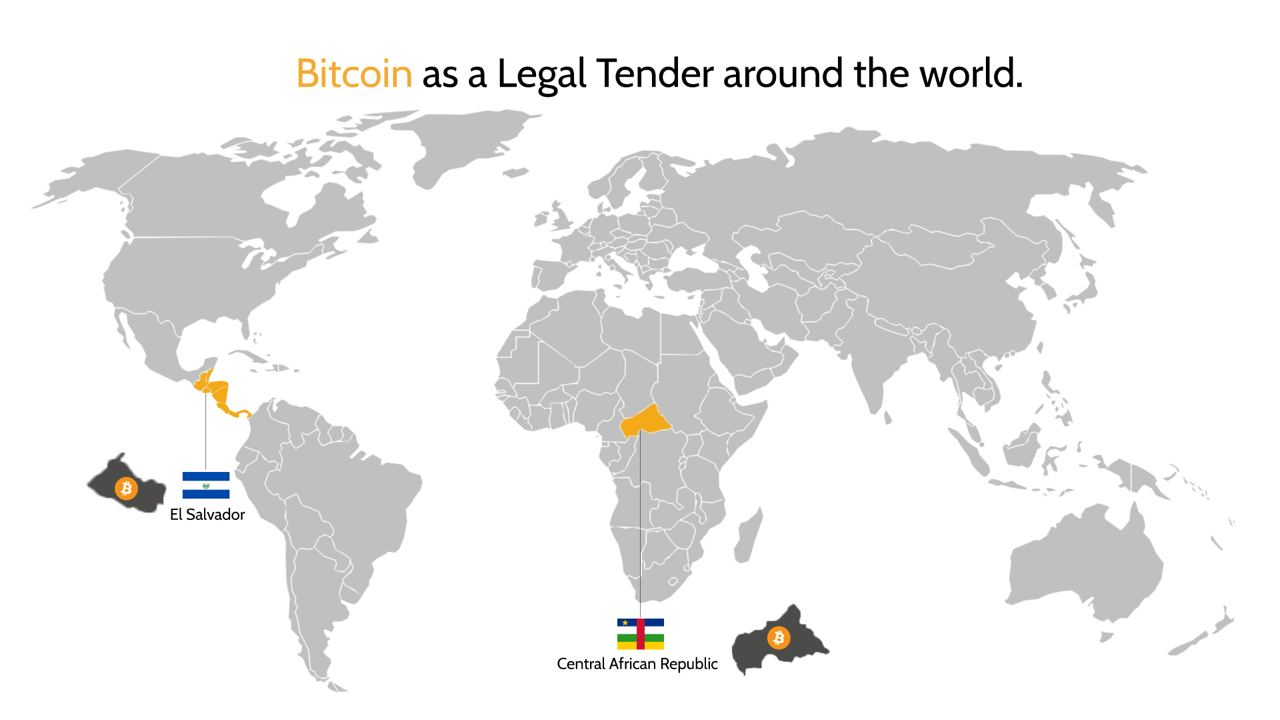Forecasting the Future: Next Countries to Make Bitcoin Legal Tender Updated 2024
Are you searching for the next countries to make Bitcoin legal tender updated 2024? Look no further. This article unpacks fresh insights and data to reveal which nations are on the cusp of integrating Bitcoin into their legal tender statutes, reflecting the dynamic cryptocurrency landscape of 2024.
Key Takeaways
- Lower middle-income countries with high grassroots cryptocurrency adoption could be the next in line to consider making Bitcoin legal tender, driven by benefits like foreign investment attraction and financial system innovations.
- The practical implementation of Bitcoin as legal tender faces challenges such as ensuring sufficient technological infrastructure, garnering political support, dealing with volatility, and addressing societal reluctance and regulatory hurdles.
- International regulatory bodies like the IMF and FATF are actively working on establishing a global regulatory framework for cryptocurrencies, focusing on compliance with AML/CFT standards and the proper application of tax laws.
Prospects for Bitcoin as Legal Tender in 2024

Adopting Bitcoin as legal tender has the potential to dramatically transform the global financial landscape by influencing foreign investment patterns and spurring innovation in central bank digital currencies. The year 2022 saw an economic downturn, and following this, lower middle-income countries exhibited a robust increase in grassroots cryptocurrency adoption. This suggests a burgeoning interest in cryptocurrencies for economic growth and stability.
Moreover, blockchain technology, the backbone of Bitcoin, has the capability to provide solutions that extend beyond cryptocurrency. It has the potential to enable improvements to international trade and broader financial services. Economic stability and ongoing digital transformation are key factors that might prompt countries to view Bitcoin and other cryptocurrencies as feasible options for legal tender.
Analyzing Economic Indicators
A larger portion of the population in countries with lower purchasing power parity per capita tends to participate in cryptocurrency transactions. This indicates a possible inclination towards Bitcoin adoption. Moreover, emerging markets often show a higher percentage of cryptocurrency activity through peer-to-peer (P2P) trading. This suggests that P2P trading could be a strong economic indicator of a country’s propensity to adopt Bitcoin.
Furthermore, the volumes of decentralized finance (DeFi) transactions, which include non-professional individual users, are indicative of grassroots crypto adoption. This can signal a country’s readiness to consider Bitcoin as a legal tender.
Technological Infrastructure
The critical infrastructure needed for Bitcoin’s adoption as legal tender relies heavily on widespread internet access and the population’s interaction with cryptocurrency service websites. In this digital age, over half of the global population owns a smartphone. This factor, alongside digital money innovation, drives the increasing public acceptance of blockchain and cryptocurrencies.
The widespread internet access and smartphone ownership are thus pivotal for the infrastructure needed to adopt Bitcoin as legal tender. As the world continues to digitize, the likelihood of Bitcoin and other cryptocurrencies becoming a mainstream part of financial systems increases.
Political Willingness
The willingness of politicians is a significant factor in the adoption of Bitcoin as legal tender. The El Salvador government’s introduction of a visa program that grants citizenship for a Bitcoin investment evidences proactive political measures to integrate Bitcoin into the national economy. Alongside this, El Salvador’s adoption of controversial policies aimed at reducing crime contributes to a political and social environment that is seen as accommodating by Bitcoin supporters.
El Salvador’s pioneering status as the first country to recognize Bitcoin as legal tender indicates a political willingness to engage with cryptocurrency frameworks. This political willingness, as seen in El Salvador, can inspire other nations to consider adopting Bitcoin as legal tender.
Pioneers in Crypto Adoption

El Salvador and the Central African Republic have tried to adopt Bitcoin as legal tender, yielding a range of outcomes and lessons. In 2021, El Salvador made history by becoming the first country to officially adopt Bitcoin as legal tender. This decision marked a significant milestone for the cryptocurrency and its use in global finance. To support Bitcoin transactions, they launched the Chivo Wallet app, directly backed by their central banking system.
Responses to El Salvador’s adoption of Bitcoin varied globally. Some countries, like Argentina and the Dominican Republic, prohibited crypto use due to financial stability concerns. Meanwhile, others are considering similar legal tender status for Bitcoin.
Lessons from El Salvador
El Salvador’s experience with adopting Bitcoin as legal tender offers valuable insights into the potential advantages and hurdles of such a decision. Some key points to consider are:
- The Salvadoran government provided a $30 sign-up bonus for the digital wallet Chivo to incentivize citizens to use Bitcoin.
- However, the majority of Salvadorans preferred cash transactions over Bitcoin, despite the interest shown by young, educated men who were already banked.
- The adoption of Bitcoin as legal tender faced challenges such as technical issues with the Chivo wallet and concerns about the volatility of cryptocurrency.
- The government’s decision to adopt Bitcoin was met with protests and opposition from various sectors of society.
These insights highlight the complexities and considerations involved in adopting Bitcoin as legal tender.
El Salvador also experienced an increase in tourism, partially attributed to its initiative to attract Bitcoin enthusiasts. Despite the initial popularity of the Chivo Wallet, over time there was a noticeable decrease in its adoption and usage for transactions and remittances.
Observations from the Central African Republic
The Constitutional Court of the Central African Republic halted the country’s attempt to adopt Bitcoin as legal tender, ruling the proposal illegal. The Court also dismissed a related proposal which would have allowed foreign investors to obtain citizenship or land in exchange for investments in Sango Coins.
These developments highlight the importance of legal and regulatory considerations, including existing laws, in the move to adopt Bitcoin as legal tender. The Central African Republic’s experience underscores the need for a comprehensive understanding of constitutional laws, international standards, and potential implications on the national economy before adopting Bitcoin.
Potential Candidates for Adopting Bitcoin

Countries such as:
- Saint Kitts and Nevis
- Paraguay
- Ukraine
- Venezuela
along with regions demonstrating high crypto activity, could potentially adopt Bitcoin. Countries in the Central & Southern Asia and Oceania regions, particularly India and Vietnam, are experiencing a significant grassroots level of cryptocurrency adoption.
Considering both specific countries and regional trends, there is a noticeable interest in Bitcoin adoption as legal tender varying from country-level speculations to observable grassroots movements.
Countries with Favorable Conditions
A strong resurgence in grassroots crypto adoption in lower-middle-income countries sets the stage for potential nationwide Bitcoin adoption. For example, Venezuela exhibits a high level of crypto usage in daily transactions, creating a favorable environment for the potential legal adoption of Bitcoin.
Both Paraguay and Ukraine have shown favorable conditions for Bitcoin adoption, with Paraguay’s proposed bill and Ukraine’s goal to become an authority on crypto signaling governmental support. These countries, with their favorable conditions and proactive governments, are strong potential candidates for adopting Bitcoin as legal tender.
Regions with High Crypto Activity

High crypto adoption in certain regions could suggest a political willingness to accept cryptocurrency. Countries like India, Nigeria, and Vietnam rank as the top three countries in the Global Crypto Adoption Index for 2023, highlighting significant crypto activity in these nations. Other countries in Latin America, like Brazil, Argentina, Colombia, and Ecuador, are also recognized as top adopters of crypto assets globally, driven by a desire for macroeconomic stability and better financial services.
Regions such as Central & Southern Asia and Oceania, with a prevalence of lower middle-income countries, show a strong grassroots crypto adoption, potentially indicating a political openness to embrace cryptocurrency. Central bank digital currencies are being considered or implemented in parts of Latin America and the Caribbean to reduce remittance costs and further financial inclusion. These regions, with their high crypto activity, could be the next frontier in the adoption of Bitcoin as legal tender.
Impact on Global Markets
The widespread adoption of Bitcoin has the potential to influence global markets, alter monetary policy, affect financial institutions, and bring up issues regarding consumer protection. The widespread adoption of Bitcoin as legal tender could cause macroeconomic instability by forcing households and businesses to choose between multiple forms of money, hindering productivity.
If Bitcoin is adopted as legal tender, it could compromise the effectiveness of a country’s monetary policy since central banks cannot set interest rates on a foreign currency like Bitcoin. In countries with stable economies and currencies, the high volatility of Bitcoin and its weak ties to the real economy provide little incentive for its use as legal tender. However, nations such as The Bahamas, Jamaica, and Nigeria have successfully launched their central bank digital currencies (CBDCs), indicating a growing acceptance of digital currencies that could co-exist with or challenge Bitcoin’s role as legal tender.
Financial Institutions’ Response
As the crypto ecosystem expands, financial institutions are evolving, and some regions are either creating or contemplating special regulatory frameworks to oversee the integration of these assets into their financial systems. Traditional financial institutions may start exploring ways to incorporate cryptocurrency transactions into their services, as well as develop new products to cater to an increasing number of countries adopting Bitcoin.
However, if Bitcoin were adopted as legal tender, financial institutions might face exposure to its price fluctuations, and it is unclear how existing prudential regulations would apply to crypto assets under such circumstances. This underscores the need for financial institutions to adapt to the evolving crypto landscape and develop sustainable strategies to manage potential risks.
Consumer Protection Measures
The implementation of consumer protection measures is vital in the crypto sector to mitigate risks tied to volatility, fraud, and cyber-attacks. Crypto legal asset use could significantly risk consumer protection, with potential for losses arising from volatility, fraud, or cyber-attacks.
Projects like Meta’s Novi have faced obstacles in consumer protection, illustrated by its suspension due to concerns over currency substitution and regulatory resistance. Unlike traditional financial transactions like those made with credit or debit cards, cryptocurrency transactions lack certain legal protections, necessitating a focus on consumer education and fraud prevention measures. The irreversible nature of cryptocurrency transactions limits the consumer’s recourse, often depending solely on the recipient’s willingness for fund return. In this context, private money, such as cryptocurrencies, presents unique challenges for both consumers and regulators.
However, technological advances in blockchain have the potential to make crypto transactions more transparent and traceable, likely increasing user satisfaction and adoption rates.
Regulatory Hurdles and Considerations
Regulatory challenges on the road to Bitcoin adoption encompass:
- Conformity with international standards
- Dealing with tax laws
- Guaranteeing compliance with anti-money laundering and counter-terrorism financing (AML/CFT) regulations
The IMF is collaborating with the Financial Stability Board and the European Banking Authority to develop a global regulatory framework for crypto asset activities, taking into account their relationship with fiat currency. The Financial Action Task Force (FATF) has issued guidelines for regulating virtual asset service providers, which include the necessity of collecting and transmitting originator and beneficiary information in line with the ‘travel rule’.
The FATF’s guidance for a risk-based approach to virtual assets outlines key areas such as:
- Sector licensing
- Customer knowledge
- Information storage
- Reporting of suspicious transactions
There is an active partnership fostered by the FATF with annual fintech/regtech forums since 2017 aimed at enhancing the understanding of risks and requirements between governments and the virtual asset service provider sector, with the involvement of the Financial Crimes Enforcement Network.
In June 2023, the FATF published an update highlighting poor global enforcement of virtual asset regulations and urged countries to address discrepancies without delay. The FATF emphasizes the urgency for immediate application of AML/CFT rules to virtual asset service providers across the globe, pressing for rectification of weak implementation and closing regulatory loopholes promptly.
Aligning with International Standards

Countries are progressing towards aligning their cryptocurrency regulations with international standards, emphasizing a comprehensive, coordinated, and uniform global response that encompasses all facets of the crypto ecosystem. Efforts are being made to minimize the use of cryptocurrencies for money laundering and other illegal transactions, with guidance from international bodies like the FATF.
The International Organization of Securities Commissions has provided regulatory guidance on crypto exchanges to align with international standards. The Financial Stability Board is developing guidance for a range of crypto assets, while other standard-setting bodies are focusing on stablecoin arrangements and the prudential treatment of bank exposures to crypto assets.
Among 60 countries studied for their approach to regulating cryptocurrencies, 32 have legalized cryptocurrencies, 19 have a partial ban, and 8 have a general ban on crypto activities. A significant number of countries are currently revising their regulatory frameworks for cryptocurrencies, with nearly two-thirds drafting substantial changes or new legislation specific to the crypto market.
Consumer protection rules aimed at preventing fraudulent activities in the cryptocurrency space are not widely implemented. Less than one-third of the reviewed countries have such regulations in place. Regulatory sandboxes are being employed by countries such as:
- Canada
- Italy
- Mexico
- Saudi Arabia
These countries are using regulatory sandboxes to experiment and collaborate with the private sector on cryptocurrency regulations.
Global governance institutions have a pivotal role in setting standards and fostering international cooperation on cryptocurrency regulation. The majority of countries analyzed, accounting for 90% of the group, are actively engaged in central bank digital currency (CBDC) projects while also updating cryptocurrency regulations.
Addressing Tax Laws
Tax laws differ from country to country, with some categorizing Bitcoin as property or financial assets, while others provide temporary tax exemptions. In Australia, Bitcoin is classified as a financial asset, which incurs a capital gains tax upon events like selling or exchanging it. The Internal Revenue Service in the United States classifies Bitcoin as property for tax purposes, influencing how gains from Bitcoin are reported and taxed.
Belarus is an example of a country that provided a temporary tax exemption on cryptocurrency activities, exempting individuals and businesses from crypto tax until 2023. These diverse approaches to taxation highlight the need for a comprehensive understanding of tax laws when considering Bitcoin adoption.
Evolving Financial Technologies and Trends
Emerging financial technologies and trends like central bank digital currencies (CBDCs), decentralized finance (DeFi) platforms, and advancements in blockchain technology could redefine Bitcoin’s role as legal tender. CBDCs are being actively piloted in countries such as Brazil, Japan, India, Australia, South Korea, South Africa, Russia, and Turkey, signaling an openness to the adoption and normalization of digital currencies in the financial landscape.
DeFi platforms are leveraging blockchain advancements to create alternative financial systems that diminish the role of traditional intermediaries, which could potentially reshape Bitcoin’s role as legal tender. Furthermore, blockchain technology is being acknowledged for its potential to enable secure, decentralized transactions that can bypass central banks and traditional financial systems, potentially leading to broader acceptance and use of Bitcoin.
Blockchain Advancements
Blockchain technology has the capability to facilitate secure, decentralized transactions and streamline asset transfers on the blockchain. The passing of legislation by the Central African Republic to allow the tokenization of land and natural resources facilitates the potential use of Bitcoin as a legal currency by enabling secure and transparent digital assets transfers on the blockchain.
This development highlights the potential of blockchain technology to revolutionize how assets are managed and transferred, and its implications for the adoption of Bitcoin as legal tender. As blockchain technology continues to advance, we may see more countries leverage its capabilities for secure, transparent transactions, potentially bolstering the case for Bitcoin as legal tender.
Shifts in Public Perception
Changes in public perception, influenced by social factors and perceived value, can sway the adoption of Bitcoin as legal tender. Positive public attitudes towards cryptocurrencies are influenced by social factors that shape perception.
The perceived value of cryptocurrencies contributes to shaping positive public attitudes. Increased customer satisfaction driven by positive views of cryptocurrency can incentivize its adoption as legal tender. As public perception continues to evolve, we may see a greater acceptance and adoption of Bitcoin, potentially paving the way for it to become legal tender in more countries.
Summary
From examining the prospects for Bitcoin as legal tender to the potential candidates for its adoption, it is evident that the move to adopt Bitcoin could significantly impact global markets, monetary policy, and financial institutions. It also raises important considerations around consumer protection and regulatory hurdles. As financial technologies continue to evolve and public perception shifts, Bitcoin’s role as legal tender could be reshaped. While the path to widespread Bitcoin adoption is fraught with challenges, it also presents unprecedented opportunities for innovation, growth, and the democratization of finance.
Frequently Asked Questions
What is Bitcoin and how can it become legal tender?
Bitcoin is a digital currency introduced in 2009, operating on a decentralized network and using blockchain technology. It can become legal tender if a country’s government officially recognizes it as a medium of exchange for all debts, public and private.
What are some potential benefits of adopting Bitcoin as legal tender?
Adopting Bitcoin as legal tender could enhance financial inclusion, enable secure and transparent transactions, and attract foreign investments, but it also brings challenges such as high volatility and regulatory issues. Consider these factors before making a decision.
Which countries are potential candidates for adopting Bitcoin as legal tender?
Countries like Saint Kitts and Nevis, Paraguay, Ukraine, and Venezuela, as well as regions with high crypto activity like Central & Southern Asia and Oceania, are potential candidates for adopting Bitcoin as legal tender.
What are the potential impacts on global markets if Bitcoin is adopted as legal tender?
If Bitcoin is adopted as legal tender, it could potentially cause macroeconomic instability, compromise monetary policy, and impact financial institutions. This could have significant implications for global markets.
What are some regulatory hurdles in adopting Bitcoin as legal tender?
Adopting Bitcoin as legal tender faces regulatory hurdles, such as aligning with international standards, addressing tax laws, and ensuring compliance with AML/CFT rules. These factors need to be carefully considered for successful implementation.

